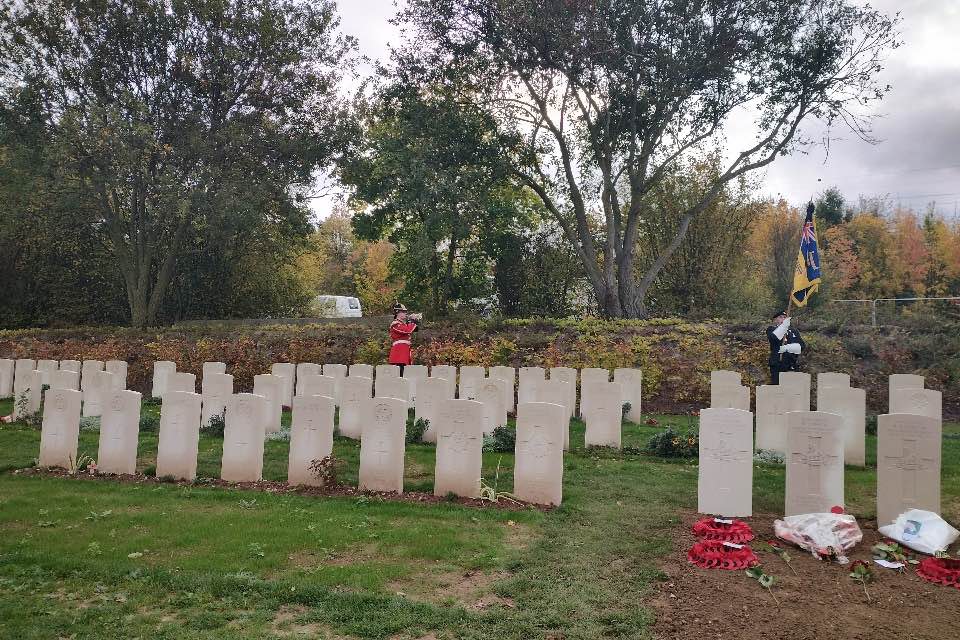


These solemn occasions were not merely acts of remembrance but profound acknowledgments of the sacrifices made by individuals who, over a century ago, gave their lives in the First World War.
On 22nd October 2025, Lance Corporal Fred Ramsbottom of the Suffolk Regiment was laid to rest with full military honours, more than a century after his death. Born in Haslingden, Lancashire, Ramsbottom was killed on 27th April 1917 during the Battle of Arras. His remains were discovered in March 2020 during a de-mining operation near Lens, France. The subsequent archaeological excavation revealed artefacts that identified him as a soldier of the Suffolk Regiment who had died after 1916.
The Ministry of Defence’s Joint Casualty and Compassionate Centre (JCCC), often referred to as the ‘MOD War Detectives’, undertook an extensive investigation to confirm his identity. Through genealogical research and DNA testing, they traced his descendants, providing irrefutable evidence that the remains were indeed those of Lance Corporal Ramsbottom. His family, present at the ceremony, paid tribute with heartfelt words that resonated deeply: “Just when his hopes were brightest, Just when his thoughts were best, He was called from a world of sorrow, To that land of eternal rest.”
Just a day earlier, on 21st October 2025, four soldiers of the Lincolnshire Regiment—Privates Cook, Cullum, Fraser, and London—were commemorated in a joint ceremony. These men, all from Grimsby, had served together and perished in the same vicinity during the First World War. Their identities remained a mystery until 2020, when their remains were uncovered during construction work for a new hospital near Lens.
The soldiers were found wearing shoulder titles indicating their affiliation with the Lincolnshire Regiment and carrying small box respirators, a piece of equipment not issued until August 1916. One man had boots stamped with the year 1917. The manner in which they were buried suggested they might have been casualties of an explosion, their bodies hastily covered over by displaced soil.
Through meticulous research, the JCCC identified these men as Privates Cook, Cullum, Fraser, and London, all of whom had been reported missing in early May 1917. DNA samples from their descendants confirmed their identities. The ceremony, attended by relatives and organised by the JCCC, was a poignant reminder of the enduring bonds of comradeship and the unyielding commitment to honouring the fallen.
These ceremonies serve as more than mere formalities; they are vital acts of remembrance and justice. The identification and proper burial of these soldiers reaffirm the nation’s commitment to honouring its war dead, ensuring that their sacrifices are never forgotten. The work of the JCCC exemplifies the dedication to bringing closure to families and restoring dignity to those who served.
Moreover, these acts underscore the importance of historical preservation and the need to remember the human cost of war. Each identified soldier represents not just a name on a memorial but a life lived, a family affected, and a community impacted. Their stories, though delayed in recognition, are now woven into the fabric of national memory.
The recent burials of Lance Corporal Fred Ramsbottom and the four Grimsby soldiers are poignant reminders of the sacrifices made during the First World War. They highlight the enduring commitment to honouring those who served and the importance of remembering the human cost of conflict. As we reflect on these acts of remembrance, we are reminded of the debt owed to those who gave their lives for the freedoms we enjoy today.
In the words of the poet Laurence Binyon:
“They shall grow not old, as we that are left grow old;
Age shall not weary them, nor the years condemn.
At the going down of the sun and in the morning
We will remember them.”
These ceremonies ensure that the memory of the fallen lives on, not just in the annals of history but in the hearts of those who continue to honour their legacy.
British and German soldiers of the Great War laid to rest together near Ypres
Bulgaria Bets on Rheinmetall to Reignite Europe’s Ammunition Industry